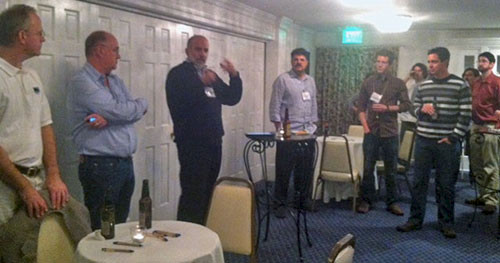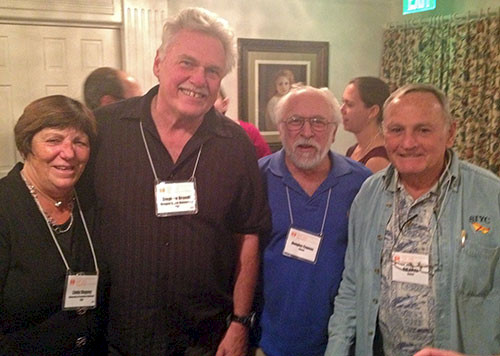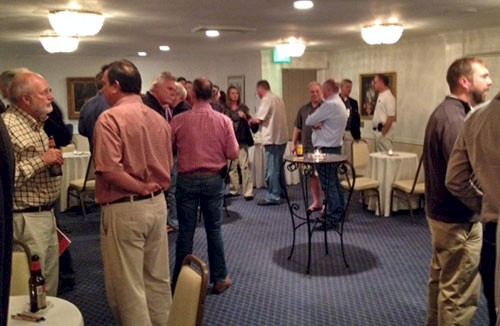UMCES Soiree at CERF 2013
Bill Dennison · | Science Communication |For the past 7 CERF conferences, UMCES has held a mixer for current and past UMCES faculty, students and staff. It has proven to be a very nice event to reconnect with a variety of people who have the common UMCES lineage that have gathered together at these biennial conferences held in different locations around the country.

Dave Nemazie and David Balcom organized the UMCES soiree and I made the following introductory remarks:
"Welcome to our UMCES soirée which has become a very nice tradition at these biennial events. We are very happy that you could join us. It is great to see so many good colleagues and friends in one place. Don Boesch sends his regards and his regrets. This is the first ERF/CERF meeting he has missed in many years. Don has important meetings in Maryland with the Governor and the Chancellor. The good news is that Governor O'Malley is really involved in Chesapeake and climate issues. The bad news is that Governor O'Malley is really involved in Chesapeake and climate issues. Don posted a tongue-in-cheek tweet to the CERF hashtag "Someone has to remain at UMCES to save the Bay, slow global warming and shrink the dead zone."
We are excited that CERF is such a vibrant scientific community, as we can trace its roots back to Chesapeake scientists. The Atlantic Estuarine Research Society grew to the federation that is now CERF and the society journal Estuaries and Coasts came from the journal Chesapeake Science. UMCES helped create the field of estuarine science beginning in 1925, the field of eutrophication science in the 1970s, develop the integrated monitoring and modeling of coastal ecosystems in the 1980s, and create environmental accountability in the 2000s. These efforts initially focused in Chesapeake Bay now have expanded to a truly global endeavor to meet those grand environmental challenges of our times.
Our new UMCES strategic plan builds on our existing strengths with increased focus in five areas: understanding genes to ecosystems, human welfare, energy choices, water security, and extending our global reach.
At this conference UMCES scientists and students have over 60 UNIQUE papers representing well over a 100 different UMCES authors. Each of UMCES' 4 labs are represented as authors or co-authors."

I introduced Tom Miller, Director of the oldest of our four laboratories, Chesapeake Biological Laboratory who spoke about our progress with obtaining accreditation under the leadership of UMCES Vice President for Education, Ed Houde. Tom also recognized Walter Boynton for his CERF leadership (Walter served as CERF President for the past 2 years), introduced the newest CBL Faculty member, Jeremy Testa, and related the recent building dedication in honor of Eugene Cronin, a longtime CBL Director and preeminent estuarine scientist. Mike Kemp, standing in for Mike Roman, Horn Point Laboratory Director, recognized the newest faculty hire, Louis Plough, the recently tenured Cindy Palinkas and talked about the successes in fund raising for Horn Point Laboratory graduate students. David Balcom, UMCES Vice President for Advancement spoke about the recent successes in philanthropy and privately funded projects for UMCES and encouraged our friends and alumni to stay connected to UMCES through the UMCES enewsletters, Facebook and Twitter accounts.
My closing remarks were based on the science communication device touted at CERF2013 of constructing sentences with ____AND____BUT____THEREFORE____:
"UMCES has a long and rich history of attracting and training environmental leaders AND tackling the most important environmental issues BUT the future environmental challenges are profound THEREFORE we need to become more connected, more effective and more catalytic. You, our past, present and future environmental champions can lead the way. Please stay connected with us, please continue to commit yourself to the great work that you do, and of course please party on."
I am pleased to report that based on the adherence to the last recommendation that I personally witnessed, that the attendees are highly likely to adhere to the first two recommendations as well.

About the author
Bill Dennison

Dr. Bill Dennison is a Professor of Marine Science and Vice President for Science Application at the University of Maryland Center for Environmental Science.